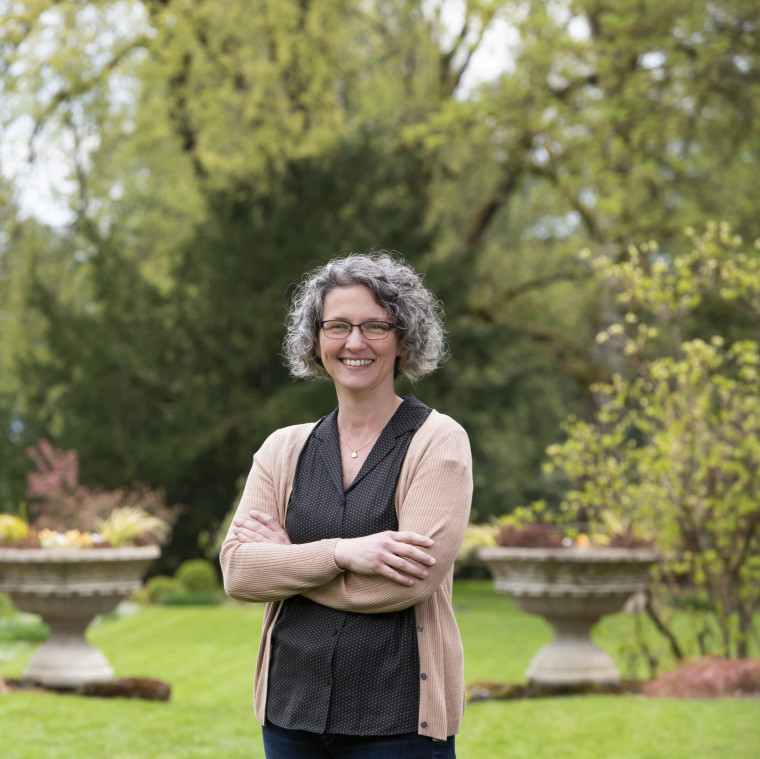Jessica Starling
The liberal arts at Lewis & Clark means being intellectually brave. Faculty and students alike really do challenge themselves to look at things from multiple perspectives, whether scientific, quantitative, aesthetic, historical, philosophical, or experiential.

Pronouns
Title
Department(s)
What three words would you use to describe Lewis & Clark?
How do you describe the liberal arts?
The liberal arts at Lewis & Clark means being intellectually brave. Faculty and students alike really do challenge themselves to look at things from multiple perspectives, whether scientific, quantitative, aesthetic, historical, philosophical, or experiential. We learn to be skeptical of easy answers, to think creatively, and to be comfortable with ambiguity, which I think are crucial skills for navigating today’s world.
What do you enjoy most about Lewis & Clark students?
Lewis & Clark students are really good at supporting each other. I also appreciate their sincerity: I know that the students in my classes are genuinely interested in the subject matter, and have a deep desire to understand the world around them. I am always impressed with the connections they make between what they’re learning in my class; what they’re studying in their history, economics, music, or art history class; or what they’re working on in their internship or sports team. It makes teaching that much more fun when I can also expect to learn so much from my students.
How does Lewis & Clark prepare students interested in your field to pursue a career and/or advanced studies after graduation?
In my religious studies senior thesis class right now, students are engaged in intensive research on a variety of topics: a 14th-century apocalyptic Muslim movement; the virtual funeral rituals that people have adapted during the pandemic; and the strategies that people in Japan have undertaken to craft arguments for the “sacredness” of Mount Fuji. While each student is working on their culminating academic project, I am also encouraging them to reflect on how the knowledge, skills, and habits that they have cultivated at Lewis & Clark will continue to serve them in the professional world—or, if they choose, in their graduate studies. We will read and discuss a wonderful book on this topic, George Anders’s You Can Do Anything: The Surprising Power of a “Useless” Liberal Arts Education. It’s clear to me that my students have the curiosity, creativity, and persistence in the face of complexity to make an impact in whatever sector they pursue after graduating. They will also have their L&C social networks and my colleagues and me as their champions, who will do all that we can to support them after they graduate.
What sets your department or program apart from other small liberal arts colleges?
We have a lovely department of four leading national scholars in the areas of Biblical studies, Mormon studies, Islamic law, and Japanese religions, respectively—who also happen to be four excellent teachers and very kind human beings! Not only do we publish books and present our scholarly work to national and international scholarly audiences, but we also get to teach small classes, often with 8–12 students in our upper-level classes. Students get so much personal attention, care, and mentoring, which comes through in the progress they make in writing, research, and gaining confidence in their work.
Also, we have a “cake-off” every year (COVID permitting)! Students form teams and decorate a cake with a religion-related theme. It is so much fun!
What’s your favorite spot on campus?
It’s hard to pick just one! The religious studies department holds our reception for senior majors every year on the patio behind Frank Manor House. It has a beautiful view of the gardens down to the outdoor pool, and even Mount Hood (on clear days!). It’s wonderful to get to know our students and their families over coffee and snacks in such a lovely setting.
What’s your favorite thing about living in Portland?
I live within walking distance of a Powell’s bookstore, a restored 1927 movie theater, an extinct volcano that’s now a city park, an urban winery, and countless restaurants. Seriously! I also love that I can drive 45 minutes for a hike through beautiful waterfalls in the Columbia River Gorge, or drive 90 minutes for snowshoeing on Mount Hood.
Describe your involvement with the health studies minor. What should incoming students know about this work?
The health studies program emerged from the Strategic Enrollment Management process. Several faculty from a wide variety of departments—including psychology, biology, neuroscience, anthropology, English, classics, and religious studies—realized that we all had an interest in various aspects of health and healing, and that each of our disciplines had something important to contribute to understanding health. We also realized that a lot of our students are interested in this, and while many of them do want to pursue a pre-med track, there are a lot of other opportunities that a background in health studies could provide for them. When we started contacting our alumni, we heard about how many of their experiences at L&C had prepared them to be successful in graduate programs and careers in health administration, policy, etc. So, we basically packaged all of those experiences together into the health studies minor. Currently, I am really enjoying teaching a 100-level course on religion and medicine that I developed for that program.
More Admissions Stories
Admissions is located in Frank Manor House on the Undergraduate Campus.
MSC: 32
email admissions@lclark.edu
voice 503-768-7040
fax 503-768-7055
Vice President of Admissions and Financial Aid
Eric Staab
Admissions
Lewis & Clark
615 S. Palatine Hill Road MSC 32
Portland OR 97219

